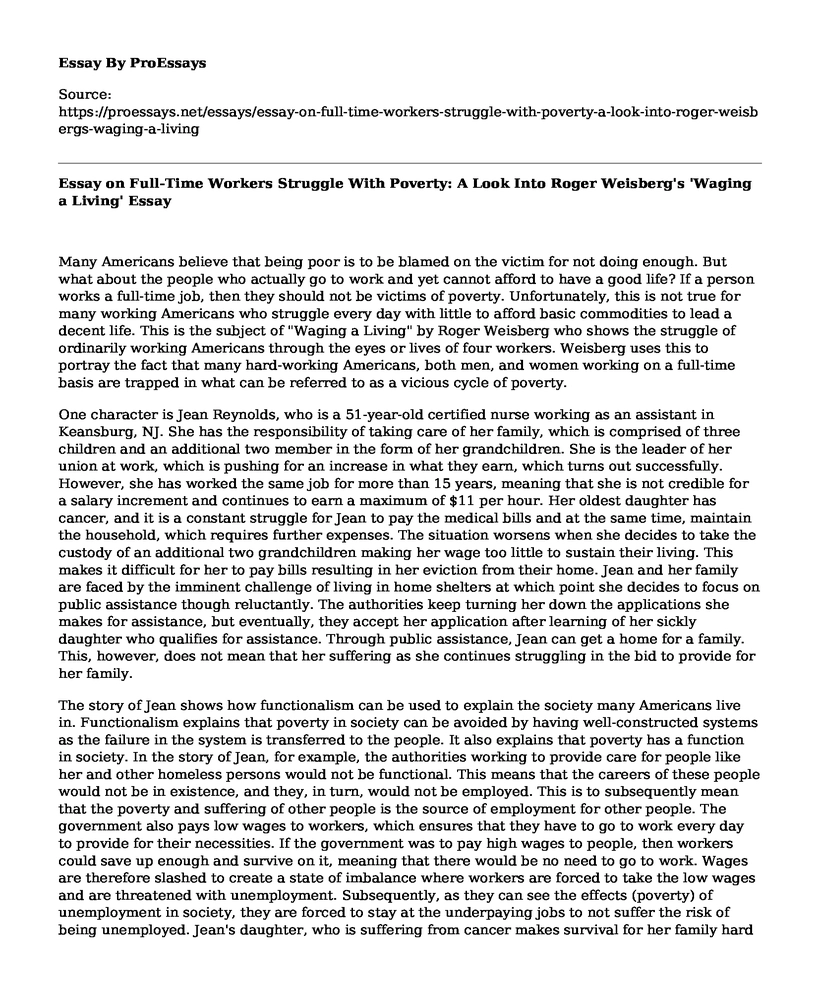Many Americans believe that being poor is to be blamed on the victim for not doing enough. But what about the people who actually go to work and yet cannot afford to have a good life? If a person works a full-time job, then they should not be victims of poverty. Unfortunately, this is not true for many working Americans who struggle every day with little to afford basic commodities to lead a decent life. This is the subject of "Waging a Living" by Roger Weisberg who shows the struggle of ordinarily working Americans through the eyes or lives of four workers. Weisberg uses this to portray the fact that many hard-working Americans, both men, and women working on a full-time basis are trapped in what can be referred to as a vicious cycle of poverty.
One character is Jean Reynolds, who is a 51-year-old certified nurse working as an assistant in Keansburg, NJ. She has the responsibility of taking care of her family, which is comprised of three children and an additional two member in the form of her grandchildren. She is the leader of her union at work, which is pushing for an increase in what they earn, which turns out successfully. However, she has worked the same job for more than 15 years, meaning that she is not credible for a salary increment and continues to earn a maximum of $11 per hour. Her oldest daughter has cancer, and it is a constant struggle for Jean to pay the medical bills and at the same time, maintain the household, which requires further expenses. The situation worsens when she decides to take the custody of an additional two grandchildren making her wage too little to sustain their living. This makes it difficult for her to pay bills resulting in her eviction from their home. Jean and her family are faced by the imminent challenge of living in home shelters at which point she decides to focus on public assistance though reluctantly. The authorities keep turning her down the applications she makes for assistance, but eventually, they accept her application after learning of her sickly daughter who qualifies for assistance. Through public assistance, Jean can get a home for a family. This, however, does not mean that her suffering as she continues struggling in the bid to provide for her family.
The story of Jean shows how functionalism can be used to explain the society many Americans live in. Functionalism explains that poverty in society can be avoided by having well-constructed systems as the failure in the system is transferred to the people. It also explains that poverty has a function in society. In the story of Jean, for example, the authorities working to provide care for people like her and other homeless persons would not be functional. This means that the careers of these people would not be in existence, and they, in turn, would not be employed. This is to subsequently mean that the poverty and suffering of other people is the source of employment for other people. The government also pays low wages to workers, which ensures that they have to go to work every day to provide for their necessities. If the government was to pay high wages to people, then workers could save up enough and survive on it, meaning that there would be no need to go to work. Wages are therefore slashed to create a state of imbalance where workers are forced to take the low wages and are threatened with unemployment. Subsequently, as they can see the effects (poverty) of unemployment in society, they are forced to stay at the underpaying jobs to not suffer the risk of being unemployed. Jean's daughter, who is suffering from cancer makes survival for her family hard as Jean has to balance between paying the medical costs and household costs. By having a well-constructed society and government, the treatment for fatal diseases like cancer should be cheap if not free. As a disease like cancer is expensive to treat, it means that most American families are just one fatal/chronic disease away from poverty. This is because, in the event of such a disease, most of the money earned by a household is directed towards the healthcare of the affected individual. The sick person is also incapacitated to work as they spend most of their time either at home or at the hospital, meaning that they become dependent on other people for their survival. Escaping poverty by these families becomes an imaginary thing as they struggle on the little they have.
Conclusion
The struggle by Jean and the other characters with factors beyond their control show how poverty is perpetuated in society and not only among the unemployed population but also among the employed citizens. These citizens live from paycheck to paycheck as they chase the elusive American dream. To conclude on the functionalist ideology, poverty comes from having a poor, constructed society. If society were well structured, poverty would not be a concern.
Cite this page
Essay on Full-Time Workers Struggle With Poverty: A Look Into Roger Weisberg's 'Waging a Living'. (2023, Jan 29). Retrieved from https://proessays.net/essays/essay-on-full-time-workers-struggle-with-poverty-a-look-into-roger-weisbergs-waging-a-living
If you are the original author of this essay and no longer wish to have it published on the ProEssays website, please click below to request its removal:
- Paper Example on Gender Diversity in Leadership
- Economic Class Status Effect to Success Essay Example
- Essay Example on Nurse's Biases and Attitudes Towards Incarcerated Individuals
- Biased Research: A Major Cause of Wrong Decision-Making
- Essay on European Sovereign Debt Crisis: Financial Crisis of 2007-2008.
- Essay Example on Domestic Violence in the Army: An Ethical Issue
- Essay Example on COVID-19 in Blythe, California: Protesting George Floyd's Murder Amidst Rising Cases







